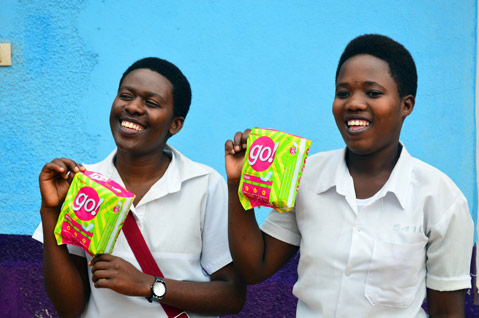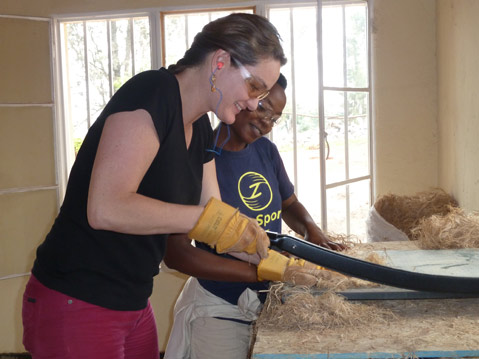Nonprofit SHE Starts Sustainable Sanitary Pad Business in Rwanda
SHE28 Campaign Promotes Menstrual Health Education In East Africa

“The Status Quo Must Go”: this is the motto of Sustainable Health Enterprises (SHE). Elizabeth Scharpf, a Harvard graduate who recently moved to Santa Barbara, founded SHE with the aim of tackling critical international issues by investing in underserved people or ideas and going beyond the traditional method of charitable donations.
In 2005, Scharpf was interning at the World Bank in Mozambique when a female boss shared with her how women and girls would often miss up to 50 days of school or work per year because they could not afford menstrual pads. “I was shocked and then a little outraged, and I just had an energy to do something,” said Scharpf. “I felt like I could do something about it.”
Having worked at the intersection of health and business for sometime, Scharpf returned home and started asking friends from around the world about this obstacle. She then realized the international extent of the issue. According to SHE, 18 percent of women and girls in Rwanda missed school or work last year due to the lack of affordable menstrual pads
Three years later, Scharpf and three MIT students arrived in Rwanda with a blender in hand and began testing local and widely available materials for absorbency — the winner being banana fiber. SHE then trained 600 Rwandan farmers to extract the fiber from the trees. This fiber is then transferred to a production site where a staff of 15 Rwandan women turns it into solar-dried “fluff” for pads.
SHE worked with local girls to design a fitting name and packaging for their new product. The three-cent pads are sold to women and distributed through schools. The production site recycles water, uses solar energy, and subsists on ten liters of water per week.

This production site is the center of the SHE28 Campaign, which focuses on health education and advocacy. SHE works in schools and in the community to dispel local taboos about health and hygiene with health workers who are trained in SHE’s curriculum and familiar with the cultural environment.
Looking towards the future, Scharpf aims to make the operations in East Africa increasingly more independent and to use the blueprint of this site to recreate a number of locations around the world. While the site in Rwanda produces 1,000 pads each day, SHE hopes to increase this number to 15,000 to reach half of the girls in Rwanda and is also preparing to launch a production facility in India. Furthermore, the organization is working with the United Nations Children’s Fund (UNICEF) to eliminate additional taxes placed on pads and has recently partnered with Johnson & Johnson.
“I think the issue of affordable menstrual pads is symbolic of a lot of little things that can make big impacts on someone’s life,” said Scharpf. Beyond the SHE28 campaign, the overarching mission of SHE is to provide access to health information and options for health and hygiene to those in need.
Before Scharpf’s endeavor, the status quo was donations of pads in six-month supplies; the 2.8 million women in Rwanda now have a functioning business producing their own local and affordable menstrual pads.



